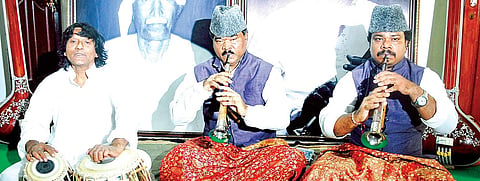

In the age of beat-dropping and bass-pumping EDM, this troupe brings soul-stirring folk music back.CE catches up with Nazim Hussain, Pandit Ballesh and Krishna Ballesh, as they gear up to perform today
CHENNAI: Taking a folk instrument and elevating its status to one worthy of global recognition is not something any musician can hope to achieve in their limited lifespan. And yet, through the colossus that he was, that is just what shehnai maestro Ustad Bismillah Khan did for the instrument. On the occasion of his birth centenary this year, City Express had the opportunity to interact with a trio of his close followers — his youngest son Ustad Nazim Hussain, an acclaimed tabla player himself, Pt. S Ballesh and his son Krishna Ballesh, who have been lifelong disciples of Bismillah Khan, and will perform at Ras Barse Utsav, a concert to be held in his honour today.
Though Bismillah Khan rarely took students, Pt Ballesh considers himself blessed that he was under his tutelage. “Though I was introduced to the shehnai through my father Pt Sanna Bharamanna, I later received ashirvaad from Ustad sahab and feel blessed to have been associated with him for over three decades,” he smiles. While the late Ustad seldom performed for cinematic scores (barring the Kannada film Sanaadi Appana, 1977), Pt Ballesh in turn has strived to take to the shehnai and its unique sound to the silverscreen as well, having performed with doyens like Ilaiyaraja and A R Rahman (he performed for the track The Dichotomy of Fame in Rockstar (2011)).
Ballesh has also had a familial bond with the Ustad’s family members, including his son Nazim Hussain, who accompanied him for 36 years. Being a part of his accompanying troupe, Ustad Nazim has been privy to several interesting incidents and anecdotes from the shehnai maestro’s life. “I heard of an incident when he was travelling to radio stations from New Delhi to Lahore and Peshawar in Pakistan, a few years after independence,” says Nazim. “At Peshawar, the compere gave a long introduction in front of all major Pakistani artistes, referring to him as a Hindustani (Indian) musician. Father was amused at this, and he remarked, ‘I have been performing on this route for so many decades — this country was born in front of me! Pakistan is merely new to you; but this is always Hindustan for me,’” Nazim recalls with a smile.
Nazim also recounts the time when his father first brought the shehnai to the global stage with such resounding success. Such was Khan’s appeal worldwide that he was even propositioned to stay and teach abroad permanently. But his heart forever yearned to be in India, especially his beloved Benaras.
“I remember once after a performance in Russia, a connoisseur asked him to stay on permanently in the country, saying that he would take care of all of his needs,” recounts Nazim. “Father put forward condition after condition, trying to dissuade the patron, who even accepted to take care of his entire entourage of nearly a 100 people!” he chuckles. “But father said that though he may perform across the globe, at the end he sees only Hindustan. When in Hindustan, he sees only Benaras. ‘Walking through the galis of Benaras, sitting on the banks of the Ganges at dawn listening to azaan from the local mosque — if this can be reproduced abroad, only then will I stay,’ Bismillah Khan had said. The patron accepted defeat!”
However, there is sadness among his followers that his legacy may have been usurped. “There have been occasions when people have brought together musicians and performed a concert in his memory, but none of the musicians in our family have been informed or invited to perform,” rues Nazim. “It does not behove his spirit if we are not included in his musical legacy.” Nazim himself has collaborated with Pt Ballesh to endorse the latter’s Tansen Academy of Music at Saligramam, who is organising the concert today. Adds Krishna Ballesh,“People think that there is a huge difference between Carnatic music and Hindustani music, when in actuality both represent one and the same. His popularity in Hindustani music down south is Ustad Bismillah Khan sahab’s enduring legacy.”
Watch them live at Ras Barse Utsav today at Music Academy, at 6pm